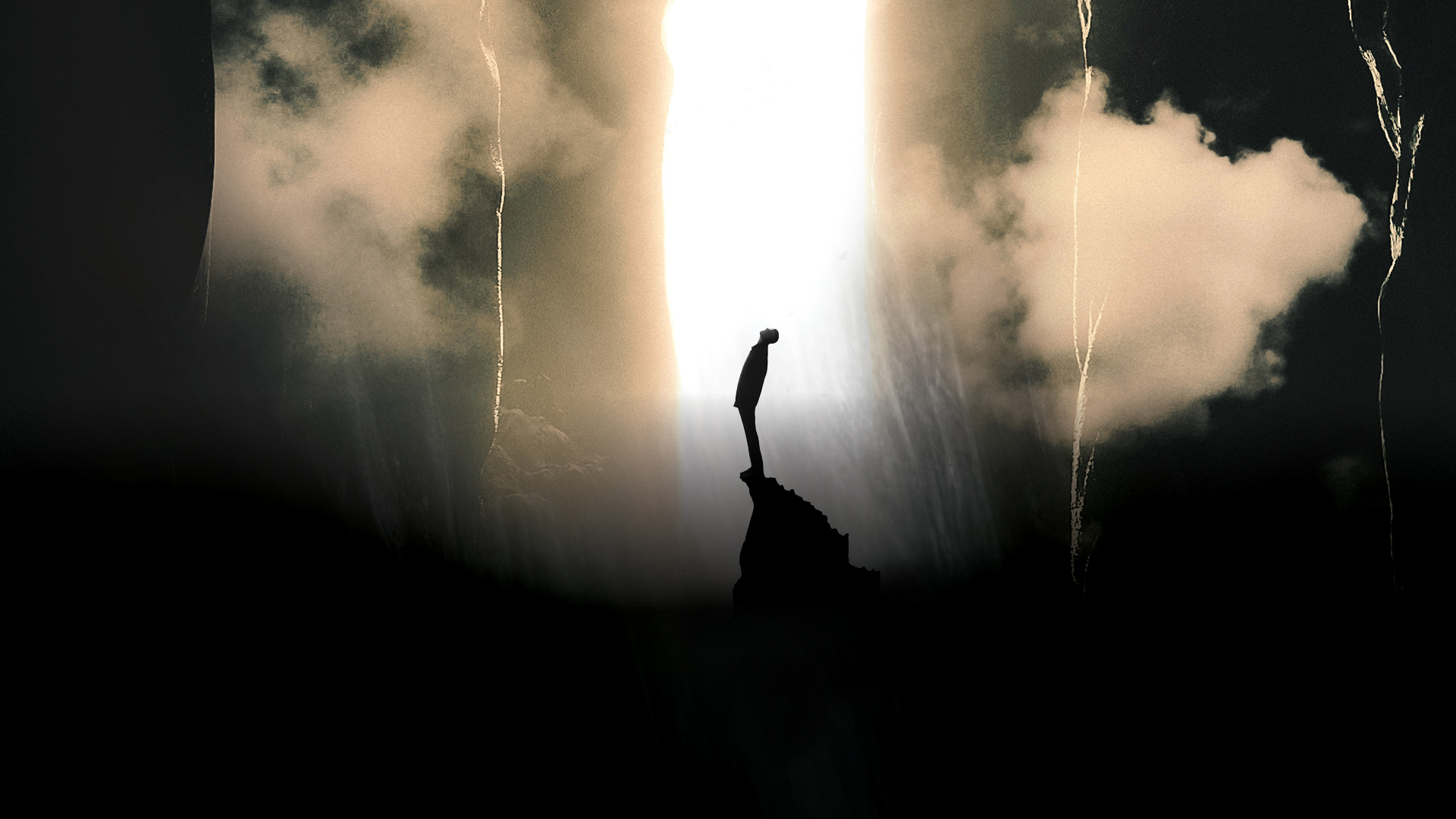Exploring the connection between mental health and religion, analyzing the Western utilization of Eastern traditions, and examining the “Faith vs. Science” dilemma: Insights from prominent speakers at SNF Nostos 2023.
“Ι am a Christian, but sometimes I wake up and I’m an atheist. Today, I woke up somewhere in between, throwing a little Islam into the mix“. Michael Niconchuk‘s eyes typically show a spark when he engages in discussions, but now, he wears a faint grin, underscoring the fluidity of religious identity. A fervent and deeply knowledgeable conversationalist, he is always ready to escalate the discourse, though in reality, he is merely presenting diverse facets of the same matter. A researcher with extensive experience in trauma-focused psychosocial support and the psychological aftermath of migration, Niconchuk is the program manager of the Wend Collective. He embarked on a scientific journey, becoming a researcher “by chance”, driven by the desire to unravel his family’s lineage: His mother hails from Guatemala, while his father’s forebears traversed from Ukraine to the United States —regions rife with conflict and where religion significantly shapes everyday life.
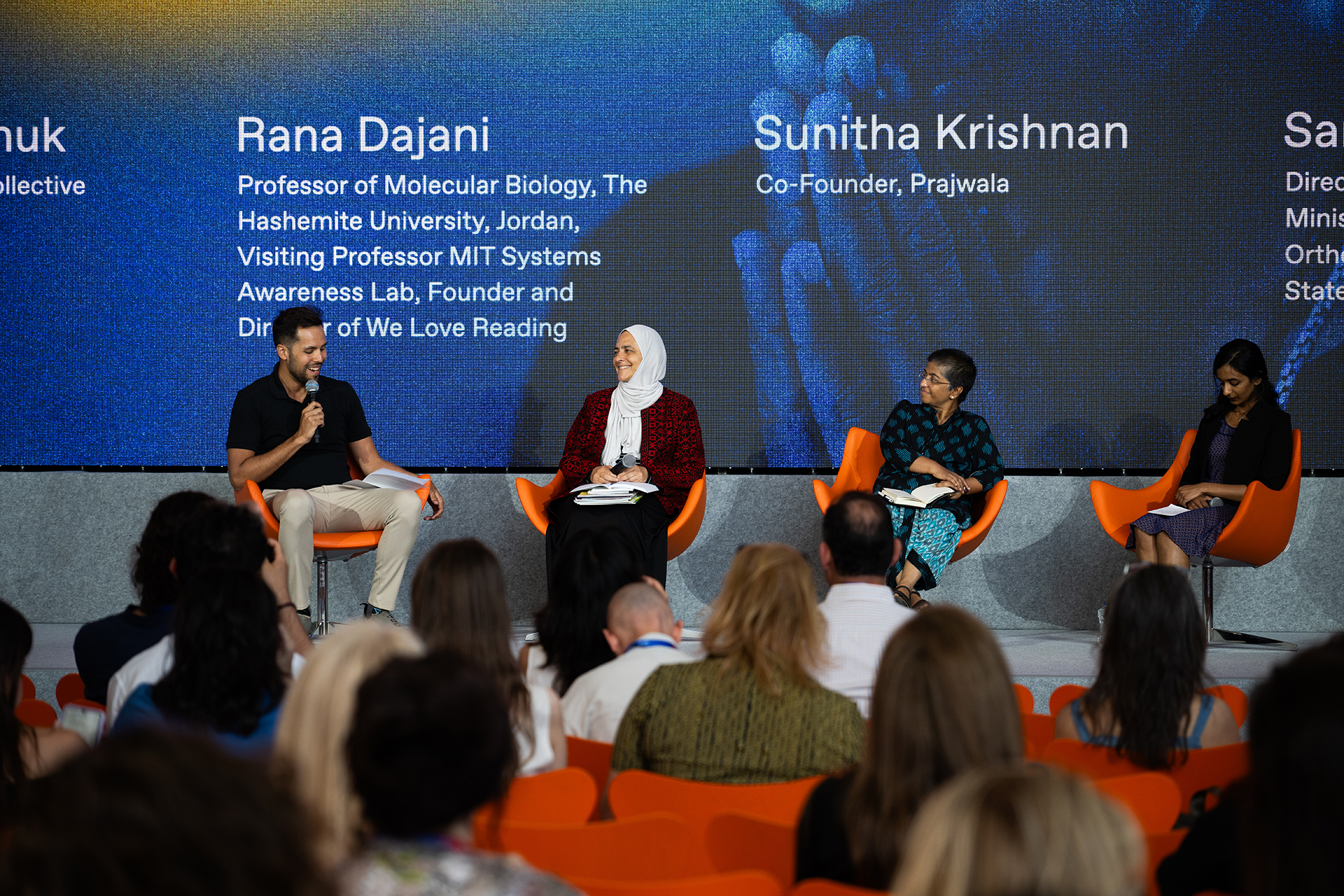
Our conversation takes place on the first floor of the National Opera House building at the SNFCC, just before he leads a discussion as part of SNF Nostos 2023, centered around “Religion, Culture, and Mental Health”. His objective is to assess how distinct faith cultures approach mental health, examining how it becomes woven into their fabric —determining what is conventional versus unconventional, modern versus rooted in centuries-old traditions. “When people grapple with difficulties, their first line of psychological defense often involves turning to someone they trust. And that someone is seldom a mental health professional. It’s usually God. Because God is a keeper of secrets. This idea of baring your innermost struggles to a complete stranger, it’s very Western, isn’t it? It’s not only the stigma associated with mental health, but also an element of curiosity. Why did X consult a psychiatrist? Is he crazy? What’s wrong with him?” Niconchuk provides the contextual backdrop to our conversation.
Is the dividing line truly a matter of West versus East? “No”, he explains. “Unless we translate it into a dichotomy of the Wealthy versus the Poor. In that case, I would agree. Capitalism plays a pivotal role in this process of redefinition. Those with power and authority repackage faith and sell it to those who are struggling to afford it. Take yoga, for instance. The tradition of Ayurveda (N: an ancient Indian medical theory) spans back thousands of years. Yet, today, we see individuals who are certified as yoga instructors specializing in addressing post-traumatic stress. I’ve been in refugee camps across the Middle East, and there, individuals —with the best intentions— sought payment for teaching yoga to refugees. So, are we trying to enforce our preferences onto others? It’s an inherently political matter”.
When people grapple with difficulties, their first line of psychological defense often involves turning to someone they trust. And that someone is seldom a mental health professional. It’s usually God.
Michael Niconchuk
Gun Violence: Thinking out of the box to take on a public health epidemic
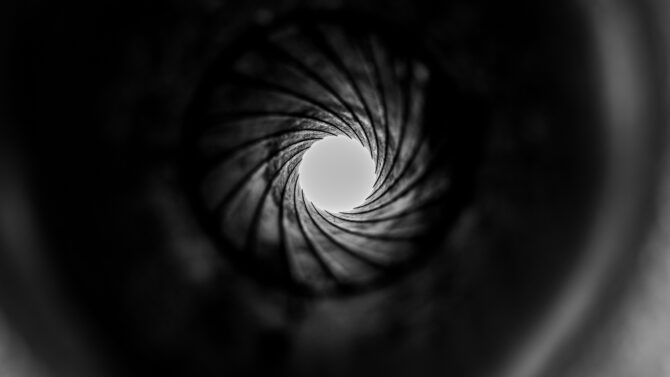
Doctors, activists, professors, and lawyers at the frontlines of America’s gun crisis – several of whom took part in SNF Nostos 2023 – talk about the reasons behind the spike in violence and what needs to be done about it
Children’s access to mental health: From Freud to ChatGPT
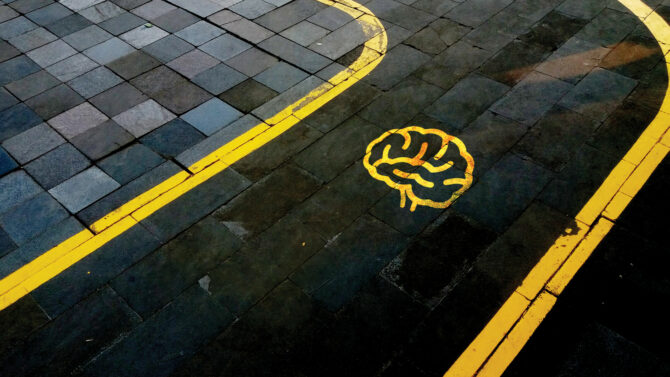
Young people’s lack of access to mental health services, the stigma and distance between AI machines and human care.
Sunitha Krishnan hails originally from India. She is the founder of Prajwala, the most extensive organization in Asia dedicated to combating sexual exploitation. Newsweek has honored her as one of the “150 Fearless Women in the World”. Krishnan, too, addresses how the privileged regions of the “developed” world are appropriating the age-old traditions of the “developing” world and transforming them into commodities.
“In today’s context,” she points out, “faith is disseminated through guru figures who supposedly offer insights into the ‘art of living’ or ‘meditation’. This evolution turns faith into an attraction that gathers millions of people. This attraction, on one hand, provides a shortcut to power, while on the other, it offers a path to liberation and redemption. The latter path, known as moksha, holds tangible significance. The former involves other factors. However, colonialism and its remnants cannot erase the historical value of our culture. They cannot completely replace it with the notion of white supremacy being the sole source of validation”.
The concept of agency, the “right to competence”, clearly shapes the interplay between mental health and faith, and it’s also subject to varied interpretations across different parts of the world. “We don’t exist in a vacuum. People are seeking solutions, offering prayers, supporting each other. They aren’t simply waiting for science to provide answers or for someone to instruct them. The West can’t unilaterally decree that the so-called global south (though I find that term problematic) can’t embrace religion. Authority shouldn’t solely reside in the West. And I refuse to accept the notion of ‘if it’s not written in English, it’s not applicable.’ Let’s not forget that the world’s first mental health hospital emerged within Arab/Islamic culture. This isn’t magic or superstition— it was a result of their recognition of the issue and the subsequent development of tools. In contrast, Europe didn’t establish such institutions until the 18th century. Thus, we must approach every aspect on equal footing”, emphasizes Rana Dajani, a Professor of Molecular Biology at Hashemite University in Jordan.
Part Palestinian and part Syrian, she researches the epigenetics of trauma (which involves understanding how trauma affects not only mental health and behavior, but also impacts hormones, the immune system, and even DNA, transmitting these effects across generations). Straddling the roles of scientist and Muslim refugee, she arrives at her initial conclusion: mental health is inherently entwined with trauma. “Generally, though”, she notes, “we tend to approach trauma from a distinctly Western perspective, conceptualizing it as an intense experience. However, this isn’t always the case. Trauma can also result from prolonged, intricate processes —ones that might never reach completion, So how can we view trauma as an ongoing continuum? What adjustments should we make? There’s also another aspect: we often exclusively perceive trauma through a negative lens. Rarely does anyone focus on how we gather our strength and progress. The positive aspect of overcoming tends to remain unseen, despite its existence”.
We don’t exist in a vacuum. People are seeking solutions, offering prayers, supporting each other. They aren’t simply waiting for science to provide answers or for someone to instruct them.
Rana Dajani
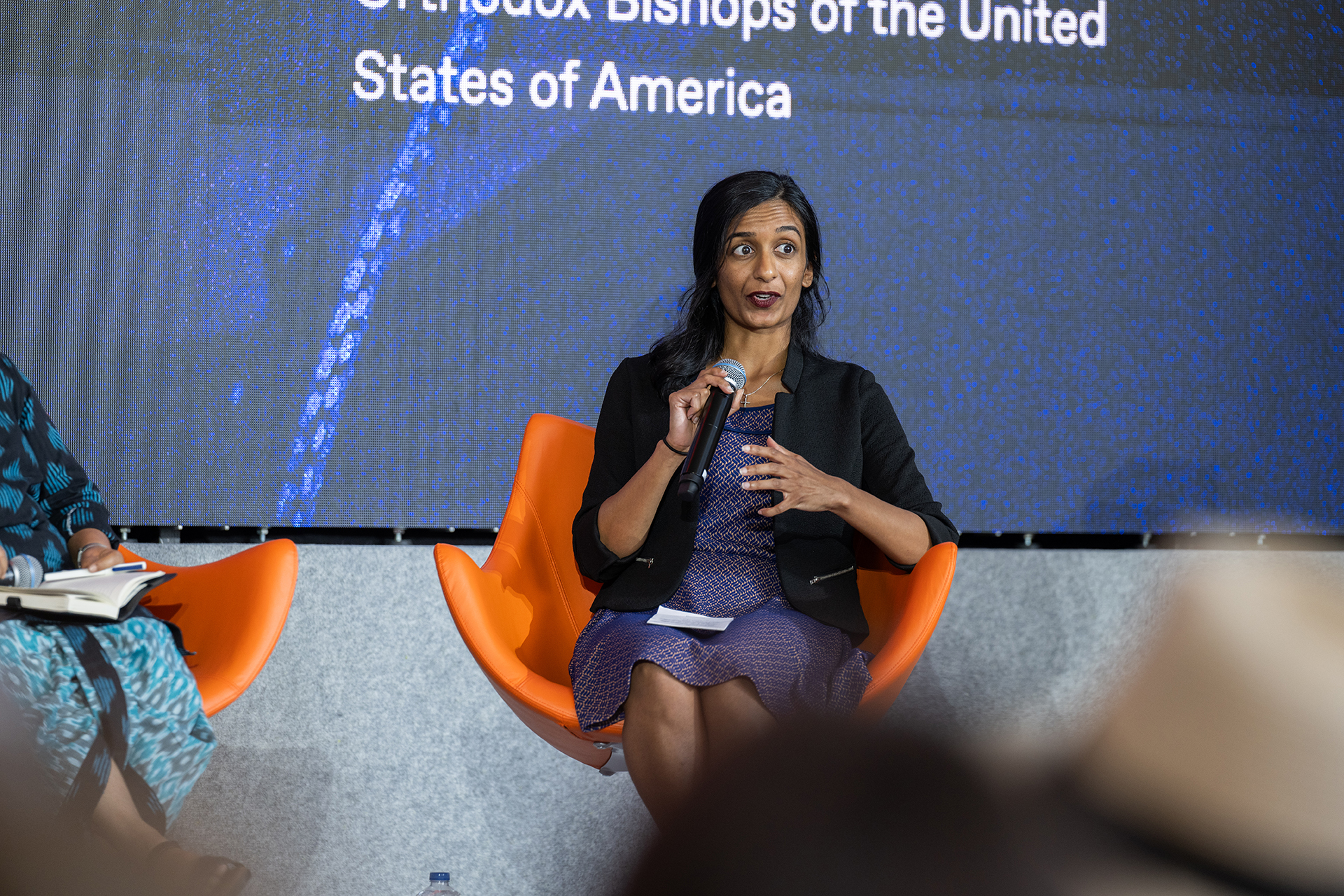
Sangeetha Thomas is the Director of Mental Health Ministries for the Assembly of Canonical Orthodox Bishops of the United States. As a psychotherapist, she specializes in trauma, working to bridge the gap between mental health and faith. “We shouldn’t perceive science and mental health as isolated concepts. When we view humans as consisting of both body and soul, we regard them as a complete entity. In today’s societies, we often witness individuals engaging in various mental health support programs while also attempting to integrate their faith —incorporating bits of Jesus into their lives here and there. While this might work for some people, it can feel contrived for others. Therefore, our aim is to invert this paradigm and focus on what’s important: caring for others”.
However, another characteristic of these contemporary, privileged, if you will, societies is the inclination to dismiss faith as irrational, as something that holds us back, as something that often exacerbates mental health through guilt mechanisms. Yet, my conversational partners, each in their own manner, challenge this dichotomy between man of faith versus man of science. “Considering oneself progressive simply due to rejecting religion is shortsighted”, remarks Sangeetha Thomas. Rana Dajani chimes in: “Religion serves as a personal strategy for managing trauma. Everyone adheres to their individual value system, searching for truth. Even those who claim disbelief in anything still align with the ideology of anti-clericalism. I don’t know whether we’re facing an escalation in mental health issues today compared to earlier times, but one thing is for certain: individualism is growing in the West. Michael Niconchuk further contributes, “Throughout the history of organized civilization, individuals have sought to tend to their mental well-being through various means —be it plants, religion, or community. Each of these methods merits investigation and study. It’s essential to break down the wall that separates faith leaders from scientists. The former should be less afraid of secularism, while the latter – psychologists, for instance –should invest time in learning about faith traditions”.
Without hesitation, the program manager of the Wend Collective also points to the dark side—where religion serves both as a sanctuary and a source of trauma, implicated in numerous sexual abuse scandals, often involving children at tender ages. Sunitha Krishnan offers her own perspective: “Precisely due to religion’s potential for manipulation, collaboration with science becomes imperative. This is because religion does indeed contain volatile elements that can act as ‘the opium of the people’. Intersections and overlaps are necessary. But this requires a conscious effort—to establish clear boundaries to pinpoint where one side’s influence starts and the other side’s role ends. To strike equilibrium between Dawa and Dua, as we phrase it in our Indian tradition“. She further underscores that constructing “villains” is futile, as this flirts with superstition even if the starting point is progressive.
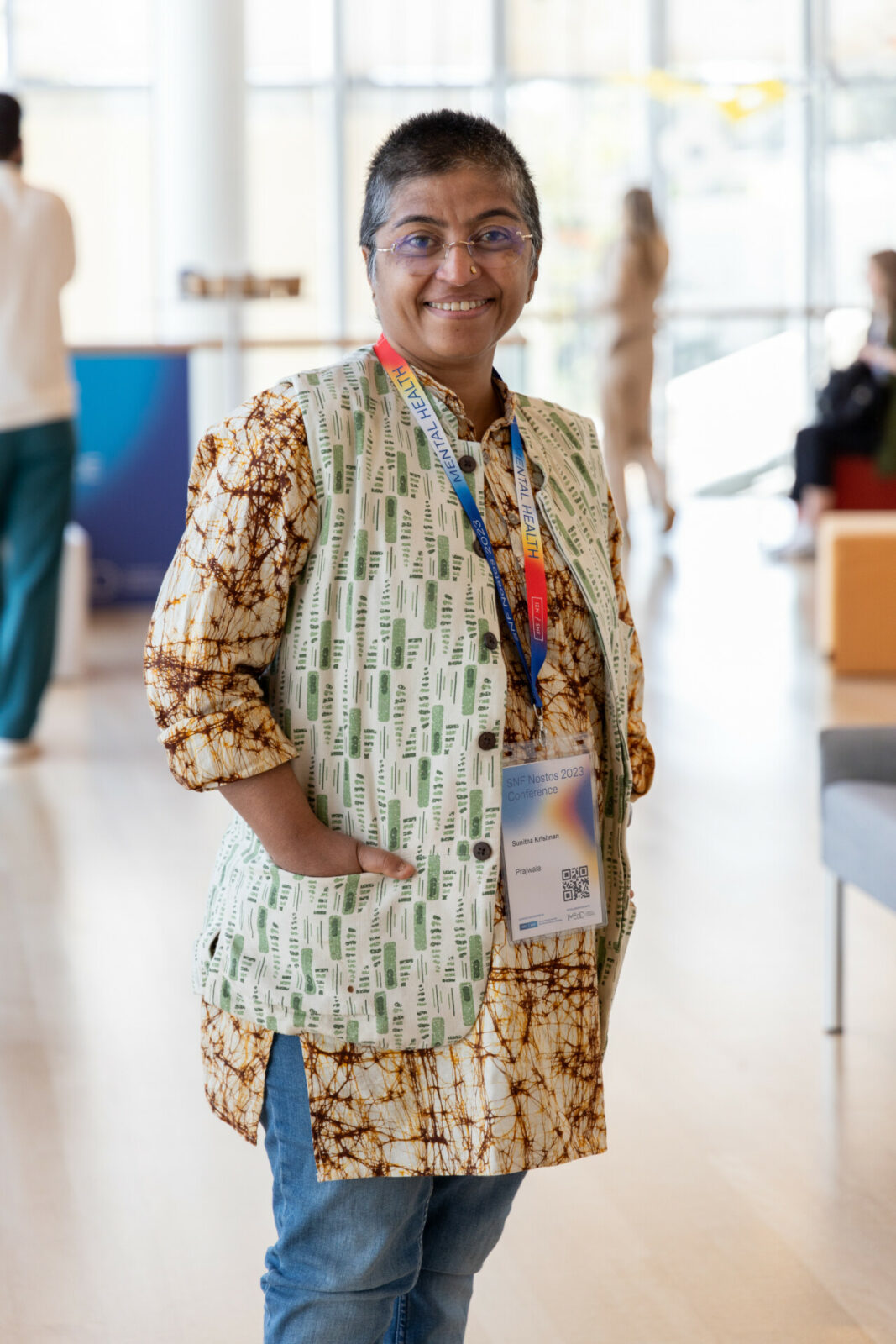
SNF Nostos 2023 Conference. Photo by: John Palaiologos/Trivision
However, religion often intertwines with politics. It becomes the glue that guides societies, an excuse for discrimination, and a catalyst for war. It transforms into a justification for violence, ultimately posing a detriment to mental well-being. “Religion frequently serves as a trigger for war, though not universally so. Instances like the Cold War or Latin American civil conflicts were driven by ideology rather than religion. As per data from the World Bank and the United Nations, we are currently witnessing the highest level of global conflicts in three decades. Our focus, however, tends to lean toward conflicts with religious dimensions as they align with our narrative. Yet, in regions like Latin America —constituting 13% of the world’s population and responsible for two-thirds of the world’s homicides— gang violence is not rooted in religious factors“, says Niconchuk, partially dismantling the opposing argument.
Addressing the issue of modern culture wars, the cultural landscape that emerged post-9/11 and the rise of 21st-century terrorism, he adopts a clearer stance: “Across history, Europe has feared Muslims, viewing dark-skinned Muslim refugees with suspicion on its soil. Even if accepted, their presence is often couched as a humanitarian gesture. On the other hand, Ukrainian war refugees did not receive equivalent treatment. None of them underwent the same scrutiny and screening process applied to Syrians or Afghans. Was this was because they were mainly women and children? Perhaps. But the same can’t be said for their Muslim counterparts. And you can’t call this racism, because Islam is not a race. I believe the understanding and coexistence with the Muslim world underwent a profound change post-9/11. Naturally, the emergence of Islamic terrorism and the rise of ISIS further exacerbated the situation”. Sangeetha Thomas adds her perspective: “After 9/11, many Christians came together in the name of patriotism, uniting around phrases like ‘God is ours’/’In God We Trust’. They sought refuge in these sentiments, inadvertently allowing religious feelings to be hijacked and labelling anything different as a threat. I know I can trust myself, but can I trust you? I will determine this based on your religious convictions. If we share the same beliefs, everything becomes easier, doesn’t it?”
Precisely due to religion’s potential for manipulation, collaboration with science becomes imperative. […] To strike equilibrium between Dawa and Dua, as we phrase it in our Indian tradition
Sunitha Krishnan
Michael Niconchuk strongly advocates for the concept of the “economy of salvation”, highlighting recent academic research from Stanford University that reveals 9th century texts originating in Uzbekistan describing clinical mental illness in nearly modern terms. He doesn’t buy into the monopoly of rationalism championed by the West, possibly driven by his own self-awareness crisis. “People have been practicing prayer for centuries, and the debate on whether prayer is effective or not will never be solved. Some attribute it to a placebo effect. No issue there. Let’s say we have free, instant access to a placebo. I think this is quite remarkable. In contrast, innovations in mental health come with a price tag. And just like that, a whole system seems to be established, leaving the poor with the remnants of services tailored for the wealthy. For instance, the controlled use of psychotropic substances isn’t a novelty; it’s a half-century-old narrative. Consider individuals spending thousands to venture into the Ecuadorian jungle for ayahuasca, while indigenous Amazonian communities have been employing similar psychedelics for generations. We cannot commodify everything simply because the secular West faces an innovation crisis in tackling stress, pressure, depression, and mental illness. What we are basically seeing here is the West’s envy of societies that still uphold the values of community and heritage”.
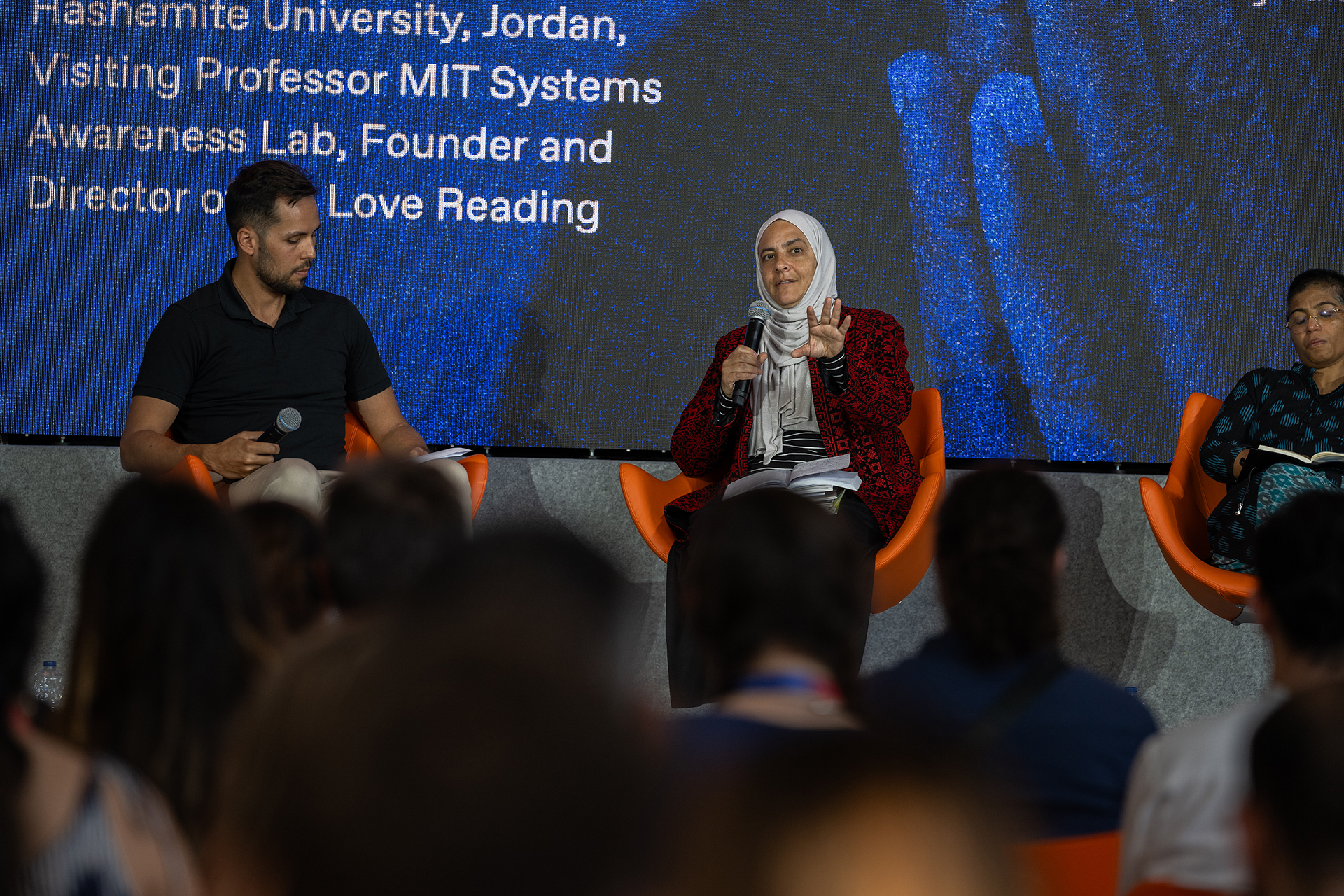
These stories, if anything, encourage us to think differently, shared by individuals with impressive backgrounds and vastly distinct starting points. “What we need is a more holistic approach,” concludes Rana Dajani. “An improved environment. Our strategies can’t be limited to either victimization or a ‘go-it-alone’ mentality. We must explore an alternative path to counter the impact of trauma. Achieving this won’t necessarily stem from a professor’s design in New York, often resulting in an expensive and impractical treatment. Everything has its positive and negative applications – from the atomic bomb to prayer. With 1.7 billion people worldwide embracing Islam, can they truly all be evil? Are they all misguided? In this 21st century, we don’t seem to be doing so well. Let’s draw from ancient wisdom, but always in a critical manner. Surely, it holds valuable insights. Let’s bring all perspectives to the table. It’s the only way to move forward”.
The universal inevitably transforms into the personal, only to regain its universality through an eternal cycle of revelation. The final reflection comes from Michael Niconchuk:
“I was raised in a conservative environment that lacked an understanding of mental health. Even I didn’t comprehend it until I was diagnosed with OCD at the age of 26. I used to think I was simply anxious, and everyone around me insisted that I was just overthinking things, without realizing that maybe this overthinking was not something I could control. There’s a pathology at play here. My family lacked the language to explain it, as did my church community. I don’t place blame on them, but it did lead to my isolation. That’s why I ended up studying neuroscience, while still holding on to my faith. Because the idea that these two aspects are mutually exclusive is a fake dilemma. Societies sometimes bear the scars inflicted by religious institutions. Yet, it’s wrong to discard all the beauty and value that religious practices hold due to this trauma. You know, I can say the same thing about democracy – we here in Athens, its birthplace, after all. Societies have suffered numerous wounds in the name of democracy. For instance, 25,000 lives rest at the bottom of the Mediterranean Sea due to the inaction of democratically elected leaders. Does this mean democracy is flawed? What should we do? Reject it altogether? No, we’re facing a leadership problem. Or perhaps democracy does have some flaws, at the end of the day. Maybe even substantial ones. The past holds answers, and we shouldn’t shy away from it. Just 50 years ago, mobile phones didn’t exist. Now we’re striving to address our mental health through these devices, even though they may contribute to mental distress. What’s required, regardless of one’s stance, is humility. No one has all the answers”.
